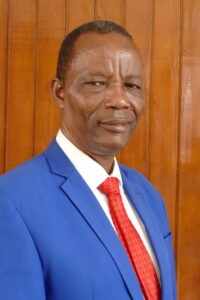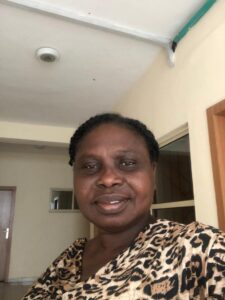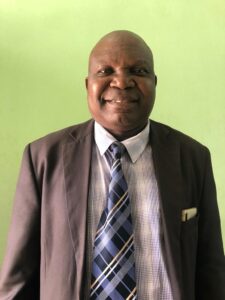The Faculty of Science started in Ibadan by offering degrees in five basic sciences: Physics, Chemistry, Mathematics, Botany and Zoology before it finally moved to Ile-Ife in 1970. Before then, significant developments took place in the Faculty leading to the establishment of the Faculty of Technology. For instance, Electronics courses were incorporated into the Physics programme which ocassioned changes in the name of the Department, first to Physics and Applied Physics and later to Physics and Electronics. A similar development took place in Chemistry with the incorporation of Chemical Technology courses into the Department which then became the Department of Chemistry and Applied Chemistry. Also, Statistics which was developed in the Department of Mathematics led to the setting-up of a Computer Centre from where the Computer Science programme eventually evolved. Similarly developments in the Faculty of Agriculture saw the emergence of technology-based programmes with Agricultural Engineering and Food Science/Technology courses in the Departments of Plant Science and Animal Science., the Departments started from the Departments of Plant Science and Animal Science, respectively. Thus, when the Faculty of Technology was established on 1st October, 1970 it was with Departments which evolved from programmes already established in the Faculties of Science and Agriculture.
The Faculty of Technology at Ife was the first Faculty of Engineering to be christened as a Faculty of Technology in Nigeria. The foundation Departments were: Agricultural Engineering, Chemical Engineering, Computer Science, Electronic and Electrical Engineering, and Food Science and Technology. The programmes of the Faculty were designed to cover the areas of engineering/technology neglected by other Nigerian Universities then offering courses in the field of engineering or technology. Some of the “new” engineering courses were Agricultural Engineering, Chemical Engineering, and Food Science and Technology.
The creation of the Faculty was in fulfillment of part of the original vision of the founders of the University of Ife in assisting to provide training facilities for the professional manpower urgently needed by the country for the development of its agricultural, industrial and mineral resources. This position was clearly stated by the then Vice-Chancellor, Professor H. A. Oluwasanmi, in his Convocation address in July, 1971 thus:
We have not created a Faculty of Technology merely because it will be a fashionable addition to the list of disciplines encompassed in an institution such as ours. In establishing this new Faculty, we have taken into account our society’s need for rapid promotion of technology. Located as we are in a rural environment, we believe that the technologies which we develop in the university should be closely linked to the solution of the problem of rural communities.
This ‘mission statement’ informed significant steps taken to develop the Faculty. The first of these was in 1974 when the Technology Planning and Development Unit (TPDU) was established to conduct policy research on harnessing science and technology for economic development. The Unit was established basically for postgraduate teaching and research2. It has been in the forefront in popularizing Technology Management as a discipline that integrates technology and management practices and generating ideas that led to the concept of University Technology Park in Ife.
The founding fathers of the Faculty also realized that a fully-developed Technology programme required other competencies than those established in 1970. For instance, the Agricultural Engineering programme would require the competences of Civil and Mechanical Engineering in the installation of teaching, research and professional practice equipment, and that postgraduate work in Agricultural Engineering required well-developed Civil and Mechanical Engineering Departments. By taking the facilities and staff on ground in the existing Departments into consideration, the university decided in 1977 to nurture Civil Engineering in the Department of Agricultural Engineering and Mechanical Engineering in the Department of Chemical Engineering. The following year (1978), to cater for the rapid growth of the metallurgical and allied industries, a degree programme in Metallurgical and Materials Engineering commenced as an option in the Department of Chemical Engineering. The Departments of Civil, Mechanical Engineering and Metallurgical and Materials Engineering became full-fledged Departments during the 1980/81 session.
Technological Laboratories
Central Technological and Laboratory Workshops (CTLW)
As early as 1975, the idea of a Technological Laboratory and Workshop was conceived. It was to be jointly sponsored by the UNDP, the Federal Government and the University. It was eventually established in 1988 as a Central Technological and Laboratory Workshops (CTLW) to provide basic but essential services (such as infrastructural support for research in the University and local small-medium-scale industries/enterprises, SMEs) and serve as a central facility for imparting engineering production and technical skills to students of the Faculty.
Central Service Unit (CSU)
A Central Service Unit (CSU) was established in partnership with the Polish Government. Its main objective was for the Faculty to service and maintain all photocopiers, typewriters, duplicating machines, etc., in the university and indeed in other universities in the country. This was the model later adopted by the NUC and implemented as the Equipment Development and Maintenance Centres in Nigerian Universities.
Equipment Development and Maintenance Centre
The Equipment Development and Maintenance Centre was established in 1989 to;
1. To organise training programmes for junior technical staff on proper use and maintenance of teaching and research equipment
2. Carrying out routine inhouse and outreach repair training workshops
3. Development of simple laboratory equipment
Student Industrial Work Experience Scheme (SIWES)
Also, the Faculty was the first in the country to make Industrial Training, now called Student Industrial Work Experience Scheme (SIWES), compulsory for all engineering students. The model has been adopted by all universities in Nigeria and is now coordinated by the Industrial Training Fund (ITF), a Federal Government Agency.
• Part 2 – 8 weeks in the Faculty
• Part 3 – 3 months in the industry
• Part 4 – a semester (6 months) in the industry
As part of its growth phase, some Departments in the Faculty were re-structured, updated (curriculum-wise) and re-named. Most of these developments were engineered by the COREN Accreditation Teams. Some were as a result of the survival/modernization strategies of the concerned Departments. For instance, during the period under review, the Department of Computer Science became the Department of Computer Science and Engineering, the Department of Food Science and Technology became the Department of Food Science and Engineering, the Department of Agricultural Engineering became the Department of Agricultural and Environmental Engineering, and the Department of Metallurgical and Materials Engineering became the Department of Materials Science and Engineering.
These frequent upgrades and programme reviews enabled the sustainability of the Faculty and its rapid expansion both in terms of staff strength and students’ population. This is evidenced by the fact that the Faculty of Technology which graduated only 20 students in 1973 registered 517 students in 1974, 1,363 in 1985 and 3,562 in 2010. In 2012 the Faculty had an all-Nigerian staff strength of 251.
The Faculty of Technology at Ife has introduced many innovations into the teaching of engineering in Nigeria. Before the establishment of the Faculty, engineering was taught in Nigerian universities as a 3-year programme (after A-Levels). Ife pioneered the 4-year engineering programme (after A-Levels). The programme was later streamlined into a 5-year curriculum (after O-Levels). This format has since been adopted by all Nigerian universities. The Faculty was also the first Faculty of Engineering to be christened as a Faculty of Technology in Nigeria.
Dean
The foundation Dean of the Faculty was Professor Howart (1971-1975 while the first Nigerian Dean was Professor V.A. Williams (1975-1977). The full list of Deans is as shown below.
Deans of Faculty of Technology, 1971-2012
The Governing Council consists of members appointed by the Visitor. The members are erudite scholars and well seasoned in their fields of endeavour. The members of the Council are drawn from varied sections of the society and are experienced persons of untainted integrity, courage and stature. The Governing is responsible to the Visitor.
Functions of the University Council
The University Council shall have the power and overall responsibility to:
- Make statutes for the organisation, policy, structure, powers, development, financing, responsibilities and general management of the university.
- Acquire landed and other forms of property for the use of the university.
- Control and superintend the affairs of the university.
- Determine the procedure for financing the university.
- Determine the terms and conditions of appointment of the Vice Chancellor; and other staff of the university.
- Appoint, promote and discipline the staff of the university on the advice of appropriate committees.
- Consider and approve annual budgets, short-term, medium- and long-term development proposals of the university.
- Consider and approve the annual report.
- Consider and approve Auditors’ reports at the end of each academic year.
- Conduct a visitation to the university at least once in every five years when new colleges/departments/programmes will come in.
Major Committees of Council
The Council normally operates through the committee system. The following shall be the main Committees of Council:
- Finance and General Purposes Committee
- Appointments and Promotions Committee
- Tenders Board
- Academic Development Committee
Other committees may be established as the Council may deem fit.
The Council shall therefore carry out its functions through the following major committees:
1. Purposes Committee
The functions of the Finance and General Purposes Committee shall be the scrutiny of the university’s budget and other financial transactions before they are presented to the Governing Council. The Chairman of Council shall also be the Chairman of the Finance and General Purposes Committee while the other members will be the Vice-Chancellor and five representatives of the Council.
2. The Tenders Committee
The main function of the Tenders Committee shall be the consideration of tenders submitted by contractors wishing to execute all major projects of the University. The Chairman of Council shall also be Chairman of the Tenders Committee. Other members will include the Vice-Chancellor, four other Council members, four representatives of Senate, one representative of the Committee of Provosts, Directors and Deans and the Registrar.
3. Appointments and Promotions Committee
The Appointments and Promotions Committee shall deal with the issues of the interview and appointment of staff of the University and present these to the Governing Council for its consideration. The Appointments and Promotions Committee will also consider staff of the University for confirmation of appointment and promotion. The Vice-Chancellor shall be the Chairman of the Appointments and Promotions Committee. Other members of the Committee will include the Deputy Vice-Chancellors, Registrar, Bursar, Librarian, Provosts of Colleges/Deans of Faculties, two representatives of Senate, Head of the Department concerned, if not already a member, and five other Council members.
4. The Fundraising Committee
The main function of the Fundraising Committee shall be to undertake fund-raising activities for the University. Although the Chairman of the Fund-Raising Committee shall be the Vice-Chancellor, the Chairman of Council shall render support as may be required from time to time. Other members of the Committee are three representatives of Council, three representatives of Senate, three representatives of Alumni Associations, the Deputy Vice-Chancellors, Registrar, Bursar and Librarian.
5. Disciplinary Committee
The terms of reference of the Disciplinary Committee shall be:
- To investigate, consider and determine all disciplinary cases involving senior members of staff of the University except the Vice-Chancellor, the Deputy Vice-Chancellors or any other member of staff as the Council may direct, provided always that any member of staff aggrieved by a decision of the Committee may appeal to Council for reconsideration within twenty-one days of the decision of the Committee.
- To make recommendations to Council on any other matter that will be in the interest of proper discipline of members of staff of the University; and
- To report to Council from time to time.
6. Academic Development Committee
The Academic Development Committee will receive and consider submissions from the Senate on all issues relating to academic development in the University including establishment of new academic programmes and units. The Committee will also advise Council on matters connected to academic development of the University in addition to reporting to Council from time to time.
Vice-Chancellors of universities in Nigeria:
- Professor Fola Lasisi (Federal University of Uyo, Uyo and Crescent University, Abeokuta),
- Professor M. O. Faborode (Obafemi Awolowo University, Ile-Ife) and
- Professor M.T. Ige (Crawford University, Igbesa).
- Professor Isaac Adeyemi (Bells University, Ota)
- Professor Rahamon Bello (University of Lagos)
- Prof. Bolaji Aluko (current Vice-Chancellor of Federal University, Otuoke),
National Merit Award
- Professor G.A. Makanjuola won the National Merit Award (NNOM) in 1992.
Prominent Alumni include
- Ms. Funke Opeke (CEO, MainOne Cable Company),
- Engr. Emman Ekuwem (Teledom International),
- Engr. Ernest Ndukwe (former Executive Director, NCC),
- Dr. Lola Borishade (former Minister of Aviation),
- Prof. Rahamon Bello (Immediate Past Vice-Chancellor of UNILAG),
- Prof. Bolaji Aluko (current Vice-Chancellor of Federal University, Otuoke),
- Dr. Olusegun Oni (former Executive Governor of Ondo State) and
- Mrs. Florence Seriki (Late) (CEO, OMATEK Computers).
- Mr Bunmi Oni – Former MD Cadbury Nigeria PLc
 Prof. Olufemi Koya
Prof. Olufemi KoyaProf. Olufemi Koya is a Professor of Agricultural Engineering. He holds B.Sc. Agricultural Engineering in 1983 from the Department of Agricultural Engineering, OAU, Ile-Ife, M.Sc. in1988 and PhD in 2002. He joined the Institution in 1989 as an Assistant Lecturer at the Department of Agricultural Engineering, OAU, Ile-Ife and rose through the rank to the position of a Professor in 2006. His research interest is in Crop Growth and Yield Modeling.
Prof. Koya had won several awards including IFS between 1994 and 1998, British Council Fellowship between 1996 and 1998 at the University of New Castle and Third World Academy of Sciences (TWAS) between 1998 and 2000. He is involved in Department for International Development (DFID) project between 2000 and 2004 focusing on Run-off Harvesting for Crop Production and United Nations Educational, Scientific and Cultural Organization (UNESCO) Institute of Hydraulic Engineering, Netherlands between 2000 and 2004.
He is a member of Nigerian Society of Engineers (NSE), Nigerian Institute of Agricultural Engineers (NIAE) and Registered Engineer with Council for the Regulation of Engineering in Nigeria (COREN).
He is married to Kikelomo and blessed with four children.
 Dr. Iyabo Olukemi AWOYELU
Dr. Iyabo Olukemi AWOYELUDr. Iyabo Olukemi AWOYELU is an Associate Professor of Computer Science. She obtained B.Sc. (Hons) Degree of Computer Science with Economics in 1994 from the Department of Computer Science and Engineering, Obafemi Awolowo University, Ile-Ife. She also holds M.Sc and Ph.D degrees in Computer Science in 2003 and 2010 respectively.
Dr. Awoyelu worked between 1995 and 1999 as a Computer Programmer at Computer Unit, Medical Records Department of Obafemi Awolowo University Teaching Hospitals Complex, Ile-Ife after the National Youth Corps Service (NYSC) from the same Department in 1994/1995.
She began her teaching and research career in Obafemi Awolowo University, Ile Ife as a Graduate Assistant in 1999 at the Department of Computer Science and Engineering, OAU. She was promoted to Assistant Lecturer in 2003, Lecturer II in 2006, Lecturer I in 2009, Senior Lecturer in 2012 and Reader in 2016. She has over 20 years of teaching and research experience. Her research interests are in Data warehousing and Data Mining.
She is a member of Nigeria Computer Society (NCS), Nigerian Women In Information Technology (NIWIT) and Computer Professionals of Nigeria (CPN). She received the Best Lecturer (Female) of the Year Award (2005/2006 Session) by the Part V students of the Department of Computer Science and Engineering, OAU.
Dr Awoyelu was on Research Visit to Indian Institute of Technology (IIT), Hyderarbad, India between November and December, 2019. She has mentored a number of Postgraduate students and has over thirty (30) published journal articles and referred conference proceedings to her credit.
She is married to Dr. Awoyelu Festus and they are blessed with three children.
 Mr. Kehinde Sunday Oluwafemi
Mr. Kehinde Sunday Oluwafemi Mr. Kehinde Sunday Oluwafemi obtained his first Degree (Bachelor of Arts in Yoruba) in Obafemi Awolowo University Ile-Ife in 1988. He later obtained Post Graduate Diploma and Masters in Public Administration in 1992 and 1995 respectively in Obafemi Awolowo University. He also obtained Certificate in Computer Fundamentals in 1995. Mr. Kehinde is a registered member of Association of Nigeria University Professional Administrators (ANUPA), Nigerian Institute of Management (MIM), Nigerian Institute of Personnel Management (NIPM), and Fellow Institute of Corporate Administration of Nigerian.
Mr. Kehinde had his National Youth Corps Service at the College of Education, Oro, Kwara State and won Kwara State NYSC merit award in 1989.
He joined the Administrative cadre of Obafemi Awolowo University as Administrative Officer I in 1999 and rose through the rank to the position of Deputy Registrar in 2012. He has worked in various units of the University among which are: Council Affairs, Postgraduate College, Academic Staff Establishment, University Liaison Officer in Lagos, Faculty Secretary of Faculty of Agriculture, University Admission Officer for nine (9) years and Faculty Secretary, Faculty of Arts. He is currently the Faculty Secretary, Faculty of Technology, Obafemi Awolowo University, Ile-Ife.
Mr. Kehinde had also have the privilege to serve as Acting Registrar, Crawford University, Igbesa, Ogun State from 1st January, 2007 to March 2008.
He was also appointed the Pioneer Registrar, Westland University, Iwo from 1st April, 2019 to 30th June, 2020.
Mr. Kehinde has attended many conferences in Nigerian and abroad. Some of the conferences attended abroad are:
(1) Association of University Administrator (AUA), Edinburg, UK in 2013 and 2014
(2) Annual Conference of the Association of International Educational Administration (AIEA) Washington DC, USA 2015.
Mr. Kehinde has served as the Chairman, ANUPA, OAU Branch from 2012 to 2017.
He is married to Hannah Adedunmala and bless with four (4) children.






